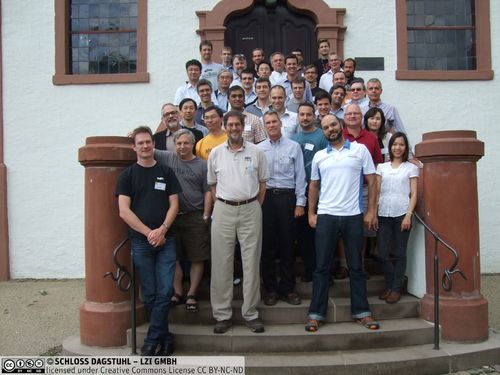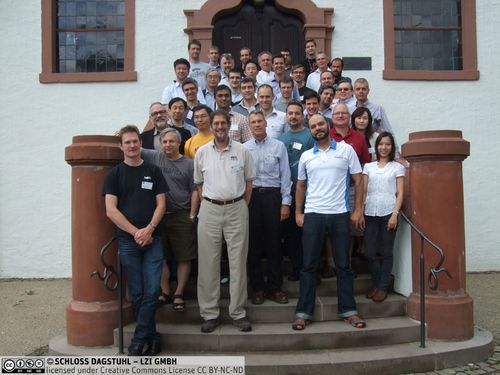Dagstuhl Seminar 14291
Information-Centric Networking 3
( Jul 13 – Jul 16, 2014 )
Permalink
Organizers
- Dirk Kutscher (NEC Laboratories Europe - Heidelberg, DE)
- Taekyoung Kwon (Seoul National University, KR)
- Ignacio Solis (Xerox PARC - Palo Alto, US)
Contact
- Annette Beyer (for administrative matters)
Informationcentric networking (ICN) is a communication paradigm where the basis for communication is named data. Instead of using endpoints to define communication (one device talking to another), ICN relies on asking for pieces of information by name independently of location.
Over the past few years, a large number of people have become involved in ICN research. Starting with the first Dagstuhl seminar on ICN in 2010, a number of high profile events have facilitated growth of a vibrant international research community.
People in both industry and academia have been involved in the various ICN project groups. They have designed architectures, created prototypes, built test beds and evaluated algorithms. So far we have learned that ICN is a truly transformational technology. ICNs are potentially more secure, more efficient and more functional than traditional networks. They can also exhibit a better incentive model than traditional networks.
We are now at a stage where several of these projects have working code ready to be tested in the real world. Various demos have shown the benefits and the potential that ICN can bring. Small-scale applications running over ICN have been demonstrated. But, we are still in our infancy when it comes to dealing with Internetwide networking problems. If ICN is to be successful, we need to be able to scale.
At this seminar we will focus on two key aspects to ICN success; scalability and deployment.
Scalability in ICN has a number of unique problems. Switching over from a limited pool of hierarchical routable addresses to the limitless world of named objects stresses every network component. How can routing algorithms scale? How can packet processing and forwarding scale? How can management scale? How can memory scale?
Deployment of ICN systems faces a number of challenges. Not only do we want to deploy an incompatible network protocol, but we also want to do it as we redesign the APIs and we turn the incentives on their head. Overlays and islands will become the norm for a while. Without coordination and the glimpse of interoperability we will have a hard time driving adoption at an internet-wide scale.
Scalability and deployment are issues faced by all ICN architectures and we believe it is important to come together and talk about the potential hurdles we face and solutions for overcoming them.
Information Centric Networks (ICN) has been a growing area of research in the past few years. The Dagstuhl ICN Seminar series has played a central role in forming the research community. The first seminar, Dagstuhl Seminar 10492, was the meeting point of the various ICN projects across the world; both from the academic perspective as well as the commercial perspective.
The community created at this event continued interacting. It was not long before the members created a set of academic workshops at the most important networking conferences; SIGCOMM, INFOCOM, etc. Following the success of the second Dagstuhl Seminar (12361), the community continued to coalesce and founded the ICNRG. The ICNRG, Information Centric Networking Research Group, was formed at the IRTF to evaluate the technology and to create a forum for companies discuss possible standardization efforts.
With the third iteration of this Seminar we've attempted to bring together the academic and commercial community together once more to discuss the state of the art in ICN. Specifically, we've focused on scalability and deployment. First, what are the problems we face in terms of scaling ICN. Are there technical limitations or political limitations. Second, what are the roadblocks in the path towards deployment. Since there will be no overnight switch, the technology must be deployed in controlled environments where interoperability can be slowly achieved.
 Dirk Kutscher, Taekyoung Kwon, and Ignacio Solis
Dirk Kutscher, Taekyoung Kwon, and Ignacio Solis
- Bengt Ahlgren (Swedish Institute of Computer Science - Kista, SE) [dblp]
- Tohru Asami (University of Tokyo, JP) [dblp]
- Kenneth L. Calvert (University of Kentucky - Lexington, US) [dblp]
- Antonio Carzaniga (University of Lugano, CH) [dblp]
- György Dan (KTH Royal Institute of Technology, SE) [dblp]
- Elwyn Davies (Trinity College Dublin, IE)
- Anders Eriksson (Ericsson Research - Stockholm, SE) [dblp]
- Suyong Eum (NICT - Tokyo, JP) [dblp]
- Kevin R. Fall (Carnegie Mellon University - Pittsburgh, US) [dblp]
- Xiaoming Fu (Universität Göttingen, DE) [dblp]
- Massimo Gallo (Bell Labs - Nozay, FR) [dblp]
- Ashish Gehani (SRI - Menlo Park, US) [dblp]
- Volker Hilt (Alcatel-Lucent - Stuttgart, DE) [dblp]
- Jussi Kangasharju (University of Helsinki, FI) [dblp]
- Holger Karl (Universität Paderborn, DE) [dblp]
- Vikas Kawadia (BBN Technologies - Cambridge, US) [dblp]
- Minyoung Kim (SRI - Menlo Park, US) [dblp]
- Dirk Kutscher (NEC Laboratories Europe - Heidelberg, DE) [dblp]
- Taekyoung Kwon (Seoul National University, KR) [dblp]
- Stefan Lederer (Alpen-Adria Universität - Klagenfurt, AT & BITMOVIN - Klagenfurt, AT) [dblp]
- Eiichi Muramoto (Panasonic Corporation - Yokohama, JP) [dblp]
- Edith Ngai (Uppsala University, SE) [dblp]
- Börje Ohlman (Ericsson Research - Stockholm, SE) [dblp]
- David Oran (Cisco Systems - San Jose, US) [dblp]
- Craig Partridge (BBN Technologies - Cambridge, US) [dblp]
- Diego Perino (Bell Labs - Nozay, FR) [dblp]
- Ioannis Psaras (University College London, GB) [dblp]
- Damien Saucez (INRIA Sophia Antipolis - Méditerranée, FR) [dblp]
- Thomas C. Schmidt (HAW - Hamburg, DE) [dblp]
- Glenn Scott (Xerox PARC - Palo Alto, US) [dblp]
- Jan Seedorf (NEC Laboratories Europe - Heidelberg, DE) [dblp]
- Ignacio Solis (Xerox PARC - Palo Alto, US) [dblp]
- Christian Tschudin (Universität Basel, CH) [dblp]
- Ersin Uzun (Xerox PARC - Palo Alto, US) [dblp]
- Matthias Wählisch (FU Berlin, DE) [dblp]
- Cedric Westphal (Huawei Technologies - Santa Clara, US) [dblp]
- George Xylomenos (Athens University of Economics and Business, GR) [dblp]
Related Seminars
- Dagstuhl Seminar 10492: Information-Centric Networking (2010-12-05 - 2010-12-08) (Details)
- Dagstuhl Seminar 12361: Information-centric networking -- Ready for the real world? (2012-09-02 - 2012-09-05) (Details)
- Dagstuhl Seminar 16251: Information-centric Networking and Security (2016-06-19 - 2016-06-22) (Details)
Classification
- data bases / information retrieval
- networks
- world wide web / internet
Keywords
- Information-centric
- network architecture
- scalability
- deployment



 Creative Commons BY 3.0 Unported license
Creative Commons BY 3.0 Unported license
